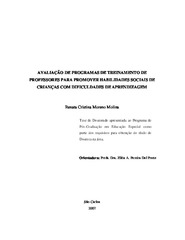Avaliação de programas de treinamento de professores para promover habilidades sociais de crianças com dificuldades de aprendizagem
Abstract
Although the importance of learning disabilities has been recognized since many years, the
high rates of failure in various series of fundamental teaching still preoccupy researchers of several areas. Recognizing the importance of the establishment and maintenance of social
interactions between students and their environment, and highlighting the relations
between the teacher and student as an element that constitutes the foundation of teachinglearning process, had as objectives initial (Stage 1): (1) to elaborate and to apply a social
skills training program concerning in-service teachers, aiming at the promotion of
interpersonal development in their students who have learning disabilities; (2) to evaluate
the possible effects of this program on the academic and social repertories of these
students. This stage was done under a near-experimental delineation, made up of an
intervention group (SA1) and two non-equivalents control groups (SA2 e SR), with evaluations of students social and academic repertories, before and after the intervention. In order to monitor the formation program, evaluations about SA1 teacher s conceptions and performances were done. The intervention s objective led the teacher to understand the role of social skills to students social and academic performance, to perceive the relations between her behavior and students behavior, and to increase her social skills repertoire promoting interpersonal development in the classroom. The results obtained after
intervention have shown: (a) teacher s difficulty in identifying and evaluating her strategies of interpersonal relations promotion, and reduction of inadequate behavior in the classroom; (b) gains in SA1 social s repertoire not equivalents to SR s and less expressive than the SA2 s. These data led to the planning of the second stage (Stage 2), which had as objectives: (1) to elaborate, apply and to evaluate a social skills training program concerning teacher's acceleration classrooms (in group), aiming at the promotion of their competence to establish facilitating conditions of social skills promotion in their students, and reductive conditions of interpersonal conflicts in classroom; (2) to evaluate possible effects of this program about the social skills repertoire in students who have learning disabilities, about the occurrence of interpersonal conflicts in the classroom, and about the teacher s social-educational skills repertoire. The eight involved teachers evaluated the social repertoire of their students before and after the intervention. In order to monitor the
formation program, evaluations were accomplished about teacher s conceptions and
performances. The intervention, configured with the same objectives as Stage 1, also aimed on emphasizing the teacher s analytical capacity. The intervention program generated gains in teachers social repertoire and in their students who had learning disabilities, confirming the benefits of Social Skills Training about the interpersonal repertoire of educators and pupils. Some considerations about Stages 1 and 2, such as participants motivational characteristics and the application of the procedures, are shown
in order to explain the difference in results that were found. Discussions about implications
of results for the Special Educations were showed too.
